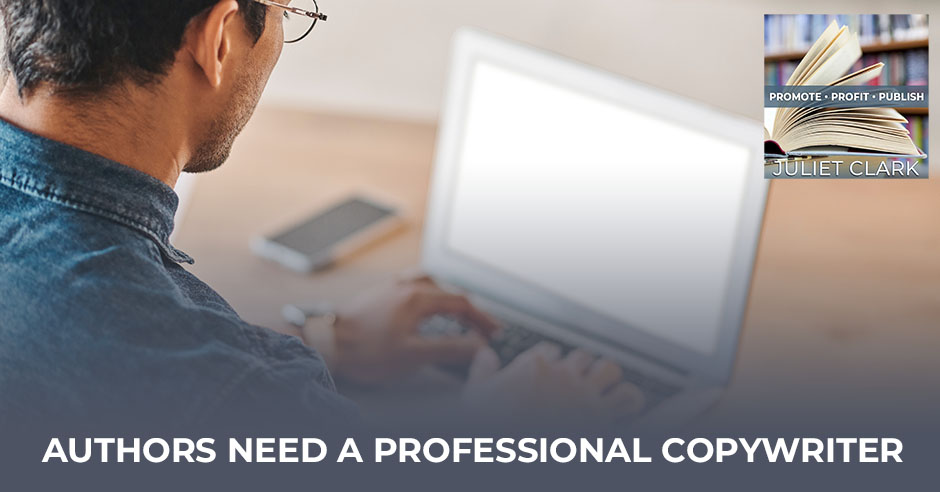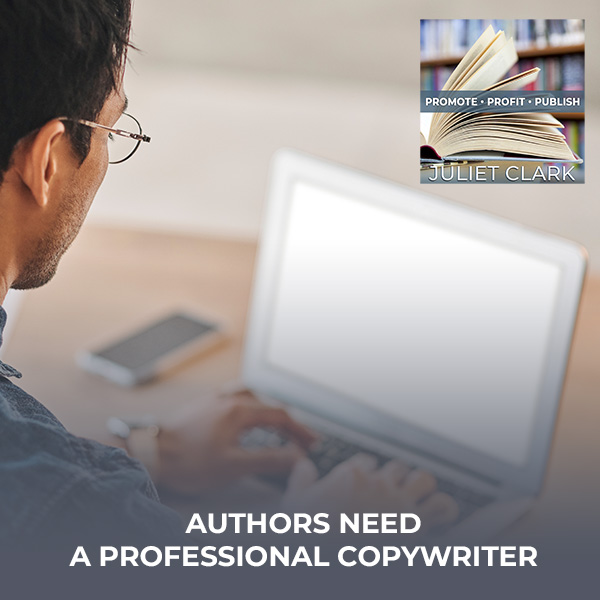
If you have a book, you don’t need strong sales skills to sell it and get people to read it. But how do we get people to read it? In this episode, Scott Bywater, the creator of the online ‘Simple Email ROI System‘ course, delves into the importance of having a professional copywriter. He reminds everyone that it doesn’t matter if you hire the world’s best copywriter. The market will determine what works and what doesn’t; you want to go in there with a game plan on what you will test and then be very non-emotional about it, like a scientist. As a copywriter, writing is where you spend the least time, but the research and editing that brings it to life. Tune in to this episode with Scott Bywater and Juliet Clark today.
—
Watch the episode here
Listen to the podcast here
Authors Need A Professional Copywriter
In this episode, we have a fun guest. I know as many of you guys are building your platforms, you’re running into, “Do I need a copywriter? How do I copywrite? What do I do?” Our guest is Scott Bywater and he is one of the most sought-after marketing copywriters in Australia. He runs what many regards as the highest-level private marketing group in Australia, Elite Marketers.
He is the creator of the online Simple Email ROI System course. Over the past several years, he has written for gurus and leading companies including Kerwin Rae, Jay Conrad Levinson of Guerilla Marketing fame, Mercola.com and The Learning Annex. He’s an in-demand speaker who has presented at James Schramko’s SuperFast Business, Dale Beaumont and Ben Simkin’s masterminds.
He’s on a mission to help coaches, consultants and course creators leverage their most undervalued asset, which is their email list, without being pushy or salesy. This is such an important episode because building your email list, the landing pages and everything around it all should be professionally copywritten. Stay tuned for our discussion with Scott.
—
Scott, thank you so much for coming on. I’m excited to have you.
Likewise, Juliet. I’ve been looking forward to this conversation.
I’m excited to talk to you because one of the things that we talk about at traffic school is when you first start to put your awareness and marketing online, you need to hire a professional copywriter for the first time. Can you talk a little bit about that and why that’s so important?
Essentially copywriting is like salesmanship in print. It’s something that gives you a lot more scale. For instance, if you create a website and put a good copy in there, it’s like having a salesperson who’s selling for you for the next ten years, day in, day out, all of that sort of thing. It’s essentially what gets the results. If we look at the case of you’ve written a book, then you’ve got this great product but how do we move that product?
That may be through things like you might do a free book plus shipping offer, for example, which Russell Brunson made quite famous. The whole idea of that funnel is that if you can get someone to pay the shipping for the book and then have the upsells, it can be self-liquidating. You’re paying for the advertising costs and then potentially getting clients on the back end of that. Also, you’re growing your email list.
A book is such a powerful foundation. There was a book called They Ask You Answer written by Marcus Sheridan. He found that if someone absorbs 30 or more blog posts before they go to a sales meeting and he was selling swimming pools, he found the conversion rate jumped from 10% to 80%. The book does that by itself because the book is 30 or more blog posts.
It doesn’t matter how you get them to absorb that information but if they absorb it, they get to like and trust you. I build that trust often via email. Sometimes you’ll get someone to reach out after they’ve been getting your email for two years. By the time they reach out to you and they’ve read so much of your content, it’s very easy to then sell.
You don’t need to have such strong sales skills if you’ve got a book and you can get people to read it. The question is, “How do we get people to read it?” That’s where the interest needs to come from. Whether you’ve got a website for the book and you’re driving them there from SEO or whether you’re running Facebook ads and you’re doing a free book plus shipping offer, however you’re doing it, you’ve got to get people to open and read that book. Producing a book and getting it to read and you’ll agree with this, Juliet, are two different jobs.
They’re two different skills too. I love that you said that about the self-liquidating funnel. As part of traffic school, we have a whole module on funnels. That’s where you come in. Everything on that funnel from awareness to relationships to close is how we position that as an arc. When you start with your first funnel, you are putting content out and you have that first lead magnet because we start a year out, that’s the time when we go to you and say, “This is our messaging or you help us with our messaging.” You write all those great reasons, not selling but awareness, about why they need to download that asset. That’s how that list starts. The drip campaign that comes after, that’s where you write that as well.
It all starts with research and understanding at a deep level. Anyone who’s written a book would have all of this knowledge very easily accessible. It’s the fears, pains, desires and beliefs of your target market. Once you understand and document that, it’s very easy to decide on what lead magnet to create. You go, “What’s the number one fear and pain?” “It’s on that.” If you’re a chiropractor, as an example and you’ve written a book and you know that your number one pain point is back pain for your target market, then an eBook about back pain would make a lot of sense.
They’ll download that eBook and then you map this out beforehand. The step is, “What does your sales process look like?” Do you want to get them onto an appointment? Is it that you want to put them into a webinar? How does that all work? You’ve got the email follow-up to move them to that next level of the sales process as such. It can require testing. Maybe back pain works but maybe knee pain or neck pain is going to be a better lead magnet.
The follow-up sequence is, “What’s going to work best there? What’s the webinar?” It’s a little bit like being an ethical scientist. You’re constantly going, “Let’s put this hypothesis out there, see what the results are from that hypothesis and then circle back.” As Russell Brunson is saying, “You’re only one funnel away.” That’s true. Yet it might take dozens of iterations to get to that one funnel. It doesn’t matter if you hire the world’s best copywriter. It’s the market that is going to determine what works and what doesn’t.
You want to go in there with a little bit of a game plan on what you’re going to test and then be very non-emotional about it like a scientist. If you run something and for whatever reason, it flops, you say, “Let’s do the next thing.” A scientist doesn’t get upset if he runs a hypothesis and it fails. He just goes, “It didn’t work. The ants didn’t like this particular type of honey. We’ll try a different type of honey or we’ll try sugar or milk.” You just keep going through that hypothesis.
It doesn't matter if you hire the world's best copywriter; the market will determine what works and what doesn't. You want to go in there with a bit of a game plan on what you will test and then be very non-emotional about it, like a scientist. Share on XThis is important because sometimes people get this idea that it’s going to be a home run from the outset. This can happen. You can put it out there and it all clicks and goes crazy. The mistake people go in is if you think running a marathon is going to be easy, you’re going to give up very quickly. You’re not going to persist. If you go in and go, “This is going to be a challenge,” then you’re willing to put the work in from the outset.
Are you a runner?
No. My son has turned me into a gym person because he loves the gym so I’m always taking him there.
I ran marathons in my youth. I’m thinking, “It’s so much harder,” even when you train. I love that point you brought up from the standpoint that people think this is instant gratification, which is part of the marketing that’s out there for marketing companies. They make you think it’s easy but we always tell authors, “Start 6 months to 1 year out. There’s always going to be a failure.”
What’s funny is you brought up three of the funnels that we have in that module, self-liquidating, lead funnel and webinar funnel. From the standpoint of where you come in on all of this, it’s not just a one-size-fits-all. There’s a different kind of funnel for different things. Also, who is that audience? Have we tapped it in the right way? Do you do the research for that or do you expect them to bring the research to you as a copywriter?
I’m happy to do both. If someone’s already done the research, that gives us a real head start. However, if they haven’t, then that’s fine. I can get on a deep dive into that. We can even do things like if they’ve got an email list, sending out a survey to that email list can be profitable too because you can put an offer on the back end of that survey.

Professional Copywriter: If authors have already done the research, that gives copywriters a head start. However, if they haven’t, then that’s fine.
That’s quite powerful because we get it from the horse’s mouth so to speak and it allows us to enter the conversation going on in their mind. If we ask them, “What’s a thing that you’re in pain about most? What’s your biggest challenge with writing a book,” and they respond and give us all those answers, then we can tabulate all those answers almost like a library.
We go, “There are 3 or 4 challenges and this is what they said.” We can feed that back to them within the copy. That’s entering the conversation going on in their mind because they are telling us exactly what’s going on in their mind. We are looking for not just a one-off but what the majority are saying. When we feed that back to them, they’re like, “Finally someone gets me.” Ultimately, that’s the best type of ad you can run. It’s when people go, “Someone understands my problem better than I understand my problem.”
If you’ve ever worked with us, we call this reflective copy. It’s almost like using NLP, Neuro-Linguistic Programming. When you learn how to mirror and match, that’s exactly what you’re doing with your copy. You’re mirroring and matching what they just told you, which is incredible. Correct me if you don’t see this in the marketplace but one of the biggest mistakes I see is experts using expert language with laypeople. That makes them feel stupid and not heard. Getting that feedback in advance gives you the opportunity to use the same language that they’re using for their problem.
When you start to use that language, rapport gets created as a result of that. I’ll give the analogy. If you walk into a physician’s practice and you’ve got some strange condition, they’re like, “Do you wake up at 3:00 AM with an itchy elbow and then your neck twinges about five minutes later?” If that happens to them, they’re like, “How did you know that?”
There’s this trust which is instantly built as a result of that. It’s finding out what that is for your target market. If you do that deep dive of research, it’s very powerful. If you want to go deep with the research, there’s Adele Revella’s book called Buyer Personas. That’s incredibly powerful. We do that process with some clients.
You’ve got a deep dive and talk with half a dozen clients and tabulate it. Once you transcribe it, it’s quite an in-depth process but it’s phenomenal because you understand the clients. She calls it the Five Buying Rings. You’re understanding things like what their buying process is and what triggered them to decide that they need to write a book, for instance.
If you understand all of that, that allows you to go even a layer deeper into their minds. The simplest way to do it is just to do it yourself. If you want to go a layer deeper, you can go into the survey. If you want to go into a layer deeper again, you can go into the Buyer Personas but don’t underestimate the importance of the research.
According to Gary Bencivenga, who’s arguably the greatest modern-day copywriter in recent years, he said that 40% of your time should be spent on research, 40% on writing and 20% on editing. The research component is critical. When you take the time to do that, it’s like anything done well and I’m sure it’s the same when you write a book. If you’ve done deep research, it shows up in the words.
With copywriting, writing is probably what you spend the least time on. It’s the research and the editing which bring it to life. Anyone can write but editing is so important. It’s like Michelangelo. You are carving it so that it pops. It’s exciting and has a rhythm, the same as music that has a rhythm. You change that rhythm and tone. All of a sudden, you’ve got it right. Copy is very much the same. I’m a big fan of tools like ChatGPT and AI. They can be great tools for speeding things up but it needs to all come together. AI’s a little bit like a chainsaw. It’s great but if you don’t how to use a chainsaw properly, you can end up chopping off your arm.
Anyone can write, but the research and the editing are what's important. Writing is what you spend the least time on. It's the research and the editing that bring it to life. Share on XI love ChatGPT though. I play with it a lot.
It’s amazing. You punch it in and you’re like, “Write me a letter about this.” It’ll come back. I use Jasper quite a bit because it’s far more granular. It’s like a Google Doc that you can dive into. You can control what it says with the fears, pains and desires if you know how to program it. It’s amazing technology.
I use both of them but we were playing around with ChatGPT. I sent them to my show like, “Tell me about Juliet Clark’s Promote Profit Publish.” It came back. I was doing a demo and I was like, “That is so much better than I think my show is.”
It speeds up the whole process. It’s amazing.
I love that book you talked about. I have that book. We also use Why They Buy by Cheri Tree. We do it for the basics. I don’t know if you’ve ever read it but it’s a starter to get people thinking, “Which piece here are my people? Here are the starter words.” That’s another book you can add to that. One of the things that a lot of people do is try to write their copy because they say, “I’ve written a book.”
Writing copy is so much different than writing a book. One of the things I see and I want you to talk about it a little bit is they don’t know the difference between their pain points and obstacles. They hit all the copywriting wrong because they don’t understand the difference between pain points and things like that. Can you talk a little bit about that? We have a lot of spiritual people. They get into the real woo-woo and it’s esoteric instead of, “Give me something tangible that I can get a result.” Can you talk about that a little bit? That’s where people struggle with copy.
The analogy that comes to me is that writing a book is a little bit like being a professor in terms of you understanding the content and you’re very knowledgeable in that topic so you can write a great book. When it comes to promoting the book, copywriting is salesmanship in print. You’re moving into sales mode, which is a different skill.

Professional Copywriter: When it comes to promoting the book, copywriting is salesmanship in print. You’re moving into sales mode, which is a different skill.
Let’s say you sell air conditioners. Who would you want to be selling them to big corporates where there are big jobs? Would you want a professor selling the air conditioners or would you want a salesperson who’s been trained to do it for 20 or 30 years? The salesperson’s going to be able to do a better job, even than the technician who understands the air conditioner better than anyone. The experienced salesperson is still going to do a better job because it’s a different skillset. The same as a dentist is going to be far better at cleaning out your teeth than a copywriter because it’s a different skillset.
As part of that though, looking at the different kinds of campaigns, your copywriting is going to be different. An awareness campaign is not going to be salesy versus a nurture campaign where you want to sell something. Can you talk about the differences there?
It comes down to salesmanship in print as well. A lot of people think it needs to be salesy if you’re selling something. If you use a copywriter, it’s going to be that hard sell old-school salesperson. He’s like, “Buy now.” If you look at what sells in the sales process, it’s very much relationship-based. If I want to sell something to you and I walk up to you on the street and start pitching you, that’s not going to work well.
If I’m like, “Buy my $5,000 coaching program. Come on. Do it,” you’re going to be like, “Hang on. I don’t know you.” There’s no trust developed and all of that sort of thing. It comes down to salesmanship in print. That wouldn’t work so why would it work on Facebook if I go out there and say, “Buy my $5,000 product directly from an ad if you’ve never heard of me?” If I walked up to you on the street, how could I grab your attention?
I don’t know this but I’m just making stuff up. If I know a little bit about you, I see you walking along and you’re suffering from back pain. I could go out and say, “I see you’re suffering from back pain. Would you like some information on that?” “Sure, I would.” “Give me your email address and I’ll send that to you.” You might be more open to that. You may not be but you might be. A percentage of people are going to be. You only need a percentage of those people and those people are then joining your list.
If then I send you an email and I start pitching you my $5,000 product straight into that, like hard pitching, then it’s like asking for marriage on the first date. People get their arms up so then it’s like building trust. The next thing, you might send some emails to nurture. This comes to understanding the pains of your target market.
You’re sending emails based on the pains of the target market and over time, you’re building trust. You might say, “Come to one of my webinars.” I’ll spend an hour coming to the webinar. At the end of the webinar, I make my $5,000 offer or whatever that offer is. There’s enough trust and relationship. There’s an understanding that I get you. That’s when a sale can be made. From the end of the webinar, it might be like, “Book in a time with me.” You’ll have a one-on-one and then that can lead to that sales process thing.
It’s very much a methodology and it all comes down to salesmanship in print but that doesn’t mean a hyper, pitchy, old-school sales approach. It means having empathy for the end client and understanding them better than they understand themselves so you can help them. Most people in the coaching consulting field got into it.
Whether they want to help people with their health, make money, have more peace of mind or whatever it is that they got into that coaching and consulting industry for, it’s generally to help people but you can’t help people if they won’t listen to you. People are very jaded somewhat with trust issues. Understandably, with some of the ways we are influenced by different powers it’d be, there are a lot of trust issues. We’re worried that someone is going to scam us. They’re going to rip us off and do all that sort of thing. Trust needs to be developed through a systematic process.
You described what I call ARC, Awareness Relationship Close, perfectly in what you laid out there. Where can we find you if we’d like to work with you or find out more?
If you go to my website, which is www.CopyWritingThatSells.com.au, that’s where you’ll be able to find me. One thing some of your people may be interested in is the AI side of things. I’ve got cheat sheets on how to quickly put stuff together with AI. It’s SimpleEmailROI.com/ai.
Every single one of you should go get that because we told you about two programs we use to copywrite. That could be the beginning of you looking at how you envision it before you engage someone like Scott. You can play around with the tools a little bit. Thanks, Scott. That’s great. I love that gift. I’m going to go over and get it myself. Thank you so much for being on the show. This was informative.
You’re welcome. Thanks for having me. It’s been a lot of fun.
Important Links
- Scott Bywater
- Simple Email ROI System
- Mercola.com
- They Ask You Answer
- Buyer Personas
- Jasper
- Why They Buy
About Scott Bywater
 Scott Bywater is one of the most sought after marketing copywriters in Australia, who runs what many regard as the highest level private marketing group in Australia, Elite Marketers.. He is the creator of the online ‘Simple Email ROI System’ course and over the past 21 years has written for gurus and leading companies including Kerwin Rae, Jay Conrad Levinson (of ‘Guerilla Marketing’ fame), Mercola.com and The Learning Annex. He’s an in-demand speaker who has presented at James Schramko’s SuperFast Business, Dale Beaumont and Ben Simkin’s masterminds – and is on a mission to help coaches, consultants and course creators leverage their most undervalued asset (their email list) without being pushy or salesy.
Scott Bywater is one of the most sought after marketing copywriters in Australia, who runs what many regard as the highest level private marketing group in Australia, Elite Marketers.. He is the creator of the online ‘Simple Email ROI System’ course and over the past 21 years has written for gurus and leading companies including Kerwin Rae, Jay Conrad Levinson (of ‘Guerilla Marketing’ fame), Mercola.com and The Learning Annex. He’s an in-demand speaker who has presented at James Schramko’s SuperFast Business, Dale Beaumont and Ben Simkin’s masterminds – and is on a mission to help coaches, consultants and course creators leverage their most undervalued asset (their email list) without being pushy or salesy.
Love the show? Subscribe, rate, review, and share!
Join the Promote, Profit, Publish Community today:









Leave A Comment